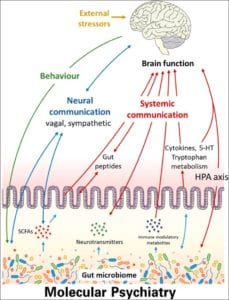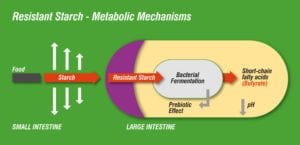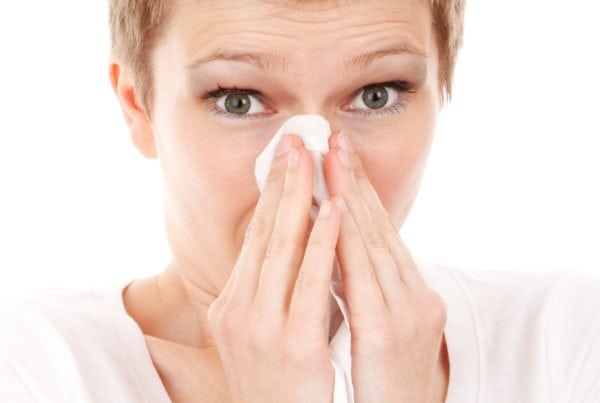With the ever expanding trend of gut health that seems to be overtaking mainstream media, there is a lot more information about the role of food in affecting mood, and ongoing research investigating the link between our gut microbiome and mental health. 1,2 Whilst there is some persuasive animal research data, human studies are more limited and the science is probably still a long way off from being conclusive enough to recommend specific therapeutic actions to treat a range of mental health conditions.
We know that there is a direct line of communication between our guts and our central nervous system, commonly referred to as the “gut-brain axis” and Nutritional psychiatrists assert that the “gut-brain” connection is the crux of managing anxiety and depression for many people. 3 And with more than 38 trillion bugs residing in our digestive system, it makes sense that the state of our gut microbiome would have a significant impact on our brain health. Research is still in its infancy and many questions remain regarding the causality between the gut microbiome and mood-related behaviours, specifically mental health conditions and illness such as anxiety and depression. 4,5
Do alterations in gut microbiota result in depression or does a depressive state induce modification of some gut species within the gut and potentially contribute to more severe depression? Certainly a chicken and egg conundrum and one that requires further investigation.
 Ref: Molecular Psychiatry (2016) 21, 738-748;
Ref: Molecular Psychiatry (2016) 21, 738-748;
doi:10.1038/mp.2016.50
Modifying the gut microbiome to improve mental health?
As with most aspects of science, specifically nutrition science, research doesn’t always provide clear answers. This is complicated also by the bi-directional relationship between the brain and the gut.
In some studies, rodents showed an onset of depressive behaviour following faecal transplantations from patients with MDD (major depressive disorder), and in others mental induction of stress and depressive behaviour in rodents resulted in reduced gut microbiota richness and diversity.,6,7,8 Systematic reviews of human studies have also found that supplementation with psychobiotics (prebiotics and probiotics) may help to treat mental health illnesses, but more clinical trials are needed to assess efficacy. 9,10, 11
There are many influencing factors that can alter the microbial community. From where one lives (farm vs. urban city) to illness, stress and overuse of antibiotics. In fact a recent large population study reported that treatment with a single antibiotic course was associated with an increased risk for depression and anxiety, rising with multiple exposures. 13 Of course one of the biggest influencers on the microbiome is diet. Eating a high fat diet has been associated with changes to the diversity of the gut microbiome and reduced synaptic plasticity (ability of synapses to respond to environment) 14,15. In addition, a lack of sufficient fermentable fibres to feed the growth of healthy bacteria can result in a decline in overall bacterial diversity, decreased gut cell wall integrity and increased gut permeability, all of which can influence brain function.
Whilst we are probably a long way away from having any clear cut answers, one thing we do know for certain is that our gut microbial communities has a major influence on mental health disorders, and perhaps a ‘microbiome-gut-brain’ model may be more appropriate. 12
The magic of short chain fatty acids
Bacterial metabolites from the gut can have a substantial influence on the regulation of the microbiome-gut–brain axis. When SCFAs (short chain fatty acids) are produced by the fermentation of dietary fibre, this stimulates the sympathetic and autonomic nervous system, which modulates brain development and behaviour. 16,17 SCFAs have a number of other ‘gut-brain’ roles including regulating brain tissue homeostasis, and releasing gut peptides, which in turn affect gut-brain hormonal communication and can influence appetite control. 18,19
There is no doubt that short chain fatty acids are important molecules and play a key role in the microbiome-gut-brain axis link. Whilst we may be a long way off from truly understanding how they exert their magic, surely it can only be beneficial to include dietary fibres that produce these moleucles in our diet?

The future of health and happiness
The advances in our understanding of the role of the microbiome in brain activity and mental health have been remarkable, and the potential value of microbiome analyses in revealing mechanisms that underpin altered brain development and mental illness is hugely exciting. As the gut-brain axis is extended to include the microbiome, scientists are faced with greater insights, yet also more challenges, to understand the complicated processes behind altered brain function and mental health. The challenge lies in pinpointing the cause and effect of specific bacteria, and translating the results into treatments. And this isn’t easy. Could it be a similar case to that of the human genome – another great hope in predicting disease and personalised preventative medicine, but which becomes more impenetrably complex the more we learn about it? The only difference is that, unlike your genome, which you can’t do an awful lot with, your microbiome is potentially modifiable.
Yours in good health,

Teri Lichtenstein (APD)
The Healthy Grain Nutrition Ambassador
References:
- Winter G. et al. Gut microbiome and depression: what we know and what we need to know. Rev Neurosci. 2018 Aug 28;29(6):629-643
- Clapp M. et al. Gut microbiota’s effect on mental health: The gut-brain axis. Clin Pract. 2017 Sep 15; 7(4): 987
- Carabotti M. et al. The gut-brain axis: interactions between enteric microbiota, central and enteric nervous systems. Ann Gastroenterol. 2016; 29(2): 240
- Dash S. et al. The gut microbiome and diet in psychiatry: focus on depression. Curr Opin Psychiatry. 2015 Jan;28(1):1-6
- Dash S. et al. The gut microbiome and diet in psychiatry: focus on depression. Curr Opin Psychiatry. 2015 Jan;28(1):1-6
- Kelly JR. et al. Transferring the blues: Depression-associated gut microbiota induces neurobehavioural changes in the rat. J Psychiatr Res. 2016 Nov;82:109-18
- Macqueen G. et al. The gut microbiota and psychiatric illness. J Psychiatry Neurosci. 2017 Mar; 42(2): 75–77
- Rogers GB. Et al. From gut dysbiosis to altered brain function and mental illness: mechanisms and pathways. Molecular Psychiatryvolume 21, pages 738–748 (2016)
- Wallace Caroline. Milev Roumen. The effects of probiotics on depressive symptoms in humans: a systematic review
- Schmidt K. et al. Prebiotic intake reduces the waking cortisol response and alters emotional bias in healthy volunteers. Psychopharmacology 232(10) · December 2014
- Sarkar a. et al. Psychobiotics and the Manipulation of Bacteria–Gut–Brain Signals. Trends in Neurosciences, November 2016, Vol. 39, No. 11
- Cryan JF, O’Mahony SM. The microbiome-gut-brain axis: from bowel to behavior. Neurogastroenterol Motil 2011; 23: 187–192
- Lurie I. et al. Antibiotic exposure and the risk for depression, anxiety, or psychosis: a nested case-control study. J Clin Psychiatry 2015; 76: 1522–1528.
- Liu Z. et al. High-fat diet induces hepatic insulin resistance and impairment of synaptic plasticity. PLoS One 2015; 10: e0128274.
- Daniel H. et al. High-fat diet alters gut microbiota physiology in mice. ISME J 2014; 8: 295–308
- Kimura I. et al. Short-chain fatty acids and ketones directly regulate sympathetic nervous system via G protein-coupled receptor 41 (GPR41). Proc Natl Acad Sci USA 2011; 108: 8030–8035.
- Macfabe DF. Et al. Short-chain fatty acid fermentation products of the gut microbiome: implications in autism spectrum disorders. Microb Ecol Health Dis 2012; 23; doi: 10.3402/mehd.v23i0.19260.
- Prinz M. et al. Microglia and brain macrophages in the molecular age: from origin to neuropsychiatric disease. Nat Rev Neurosci 2014; 15: 300–312.
- Wren AM. Bloom SR. Gut hormones and appetite control. Gastroenterology 2007; 132: 2116–2130
Intended as general advice only. Consult your health care professional to discuss any specific concerns.





